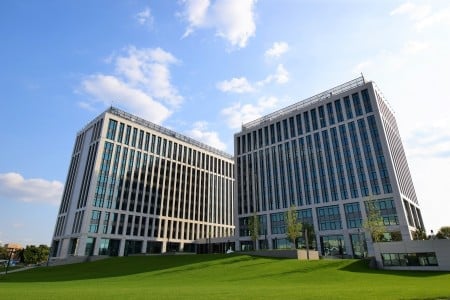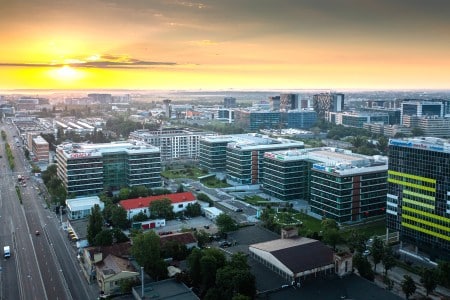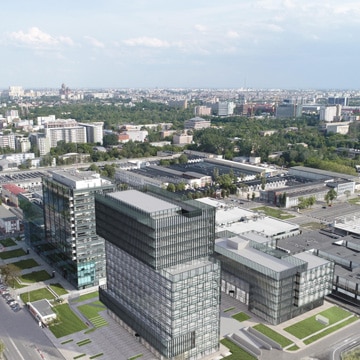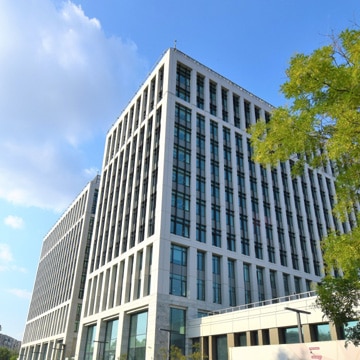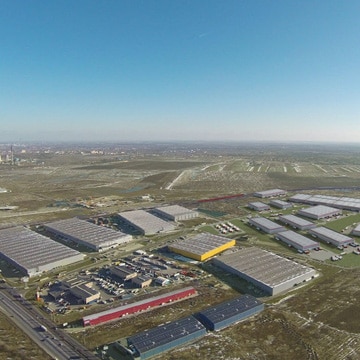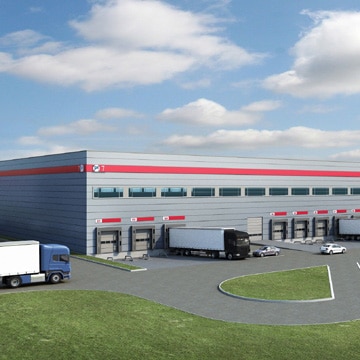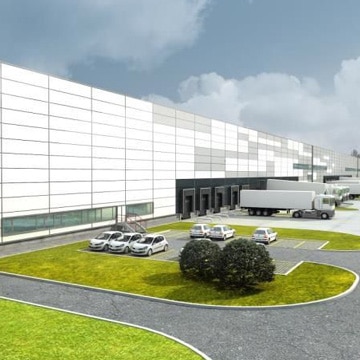The decision to choose a new office location is no longer just an operational one, but a strategic move that reflects a company’s identity and vision. In the current context, the Romanian office market is moving towards spaces that offer not only a prestigious location but also flexibility, technology, and sustainability. This smart approach allows companies to optimize their rental costs, maintain their agility, and provide a working environment adapted to the needs of employees in hybrid teams.
The Bucharest office market, with a stock of modern office space of over 4 million sqm, is dominated by the demand for high-quality rental offices from medium and large companies. Despite a limited supply of new projects, the market remains stable and continues to attract companies looking for a new headquarters. This dynamic is also evident in the country’s major cities, such as Timisoara, Cluj, Iași, and Brașov, which continue to consolidate their position as business hubs, offering a modern office stock, suitable for expanding companies.
The essential steps in the process of renting a modern office space
The process of renting an office space is not a simple transaction, but a strategic project that requires rigorous planning. From the first internal analysis to the actual relocation, each phase contributes to the final success of the move.
We provide you with a guide to renting modern office space below:
Phase 1: Internal strategic analysis (3-6 months)
The decision to relocate a company, especially a medium or large company, is a long-term commitment. Strategic planning, which can take between 3 and 6 months, is essential to avoid costly mistakes. This stage begins with an internal assessment of the company’s current and future needs. It is crucial to determine the required area not only for the time of relocation, but also for expansion plans for the coming years. Requirements related to design, type of office space (open-space, private offices, relaxation areas), and technological and comfort facilities are also defined.
A fundamental aspect of this stage is the choice between renting or purchasing office space. Renting the office space offers greater flexibility and requires much less initial capital, allowing companies to preserve liquidity for investments in core business lines. On the other hand, purchasing a property gives full control over the space and can become a valuable asset in the long term, but requires a significant financial effort at the beginning and reduced flexibility in the event of a rapid future relocation. The real value of this stage lies in the ability to anticipate needs and align the real estate decision with the company’s overall business strategy.
Phase 2: The search and selection of properties (2-4 months)
Once the internal needs are clearly defined, the active search process begins. The office market in Romania, especially in Bucharest, is diverse, from offices in interbellum villas to ultra-modern office buildings. Bucharest’s business districts such as Piața Victoriei – Aviatorilor, Barbu Văcărescu – Floreasca, Politehnica – Grozăvești, or Bulevardul Expoziției, as well as downtown areas with “boutique” buildings of 500-1,500 sqm, offer a wide range of office space for rent. In addition to the Capital, large cities such as Timișoara, Cluj, Iași, or Brașov have a modern office stock, suitable for companies in full regional expansion.
Property evaluation goes beyond visual inspection. Key evaluation criteria include: accessibility (proximity to public transportation, including metro, tram stations, and bike paths), quality of amenities (HVAC systems, security, parking spaces), included services (maintenance, cleaning, high-speed internet connection), and sustainability certifications. This stage requires detailed comparative analysis and multiple viewings to select a shortlist of suitable properties for negotiation.
Phase 3: Negotiating and Finalizing the Contract (1-3 Months)
This is the critical phase of the process, where office rent negotiation skills and legal expertise are vital. A successful negotiation is not limited to setting the rent per square meter, but focuses on obtaining the best conditions for the tenant in the long term.
Key elements subject to negotiation include the effective rent, the contract period (usually 5-10 years for large companies), fit-out costs, etc.
The professional negotiation process often involves sending a formal Request for Proposal (RFP) to the owners of the shortlisted buildings. The responses are then qualitatively and financially analyzed, and negotiations focus on the contractual terms, before the final lease agreement is drafted and signed. Exit clauses or renegotiation possibilities are essential points to watch, especially in the context where companies want to retain the option to re-adapt their space according to future needs.
Phase 4: Office fit-out and Relocation (2-8 Months)
Once the lease agreement is signed, the execution phase begins, which requires meticulous coordination among multiple teams. The office fit-out process is crucial for aligning the space with the company’s specific culture and needs. A dedicated project manager or team supervises this stage, from initial planning to effective implementation, while ensuring the project stays within budget and on schedule.
The actual relocation, which includes moving furniture, IT equipment, and documents, requires detailed logistical planning to minimize business disruption. Specialized moving companies can ensure a smooth transition, while the internal team handles administrative aspects such as updating the company’s address and informing partners and clients.
Strategic Differences: The Needs of Medium vs. Large Companies
While the office leasing process follows a similar structure, the priorities and approaches of medium-sized companies and large corporations differ substantially. These differences influence every stage of the decision-making process.
Medium-Sized Companies (a few hundred square meters)
Medium-sized firms, which typically seek offices ranging from a few hundred square meters to around 1,500 square meters, are characterized by a strong need for agility and adaptability. Their planning horizon is often shorter (3-5 years), and their main priority is the ability to grow organically. These companies are the engine of the office market, dominating transactions with an average transaction size under 1,400 sqm in Bucharest.
Preferred solutions for this segment are flexible or modular offices, which allow them to add new workstations as the team expands. Another type of property that attracts medium-sized companies is the boutique building, typically 500-1,500 sqm. These offer greater control over the space and a stronger brand identity, serving as an alternative to large office campuses.
Large Companies and Multinationals (thousands of square meters)
Large corporations, with transactions that can reach thousands or even tens of thousands of square meters, like Genpact’s renegotiated contract for 30,000 sqm or BCR’s for 22,000 sqm, have a completely different approach. Their planning horizon is long-term, focused on stability and brand image.
These companies seek prestigious, A-class buildings that reflect their status and values. They prefer to sign long-term leases, typically for 5-10 years. In the case of large corporations with a smaller local presence, there is a trend to use flexible offices as extensions of their main headquarters for project teams or temporary space needs.
The Essential Role of a Real Estate Consultant in the Leasing Process
Leasing office space, whether for a medium or large company, is a complex transaction that requires specialized expertise. A professional real estate consultant is more than just an intermediary; they are a strategic partner who can add value at every stage of the process.
Market Expertise and Access to “Off-Market” Listings
A consultant specializing in the office market has a deep knowledge of market trends, rent prices, and available properties. With access to an extensive network of landlords and developers, they can identify not only public listings but also “off-market” or sublease opportunities that have not yet been listed, substantially increasing the client’s options. Furthermore, a consultant will be familiar with the specific environment of landlords in target locations and can provide valuable insights into the flexibility a client can expect within a lease agreement.
Negotiating Power and Protecting Interests
A consultant’s primary role is to act as a skilled mediator during negotiations. With experience in similar transactions, a consultant can secure far more favorable financial and contractual terms than a tenant could on their own. This includes negotiating rent, rent-free periods, or the landlord’s contribution to fit-out costs to ensure the offer aligns with market conditions and the chosen property provides competitive commercial terms. Beyond financial aspects, the consultant helps find contractual formulas that protect the client’s legal interests throughout the entire process, from evaluation to signing the lease.
Integrated Process Management: Saving Time and Resources
Collaborating with a consultant transforms a tedious and time-consuming process into an efficient and structured one. They provide an “all-in-one” experience, from the initial needs assessment and property search to coordinating negotiations and assisting with transaction finalization. By delegating these complex tasks to an expert, company management can focus on the core business, ensuring a smooth transition with minimal impact on productivity.
Conclusions and Recommendations
The Romanian office market, particularly the office market in Bucharest, is mature, dynamic, and aligned with global trends of flexibility and sustainability. Navigating a successful office lease process for a medium or large company requires a strategic approach, meticulous planning, and, most importantly, a deep knowledge of the market.
A partnership approach is key to success. The office leasing process is too complex to be managed without assistance, and a real estate consultant adds essential value through their expertise, negotiating power, and ability to streamline the entire process. Choosing the right partner, one who knows the market and has a vast portfolio of properties, can make the difference between a simple move that could lead to problems and a strategic decision that contributes to the long-term growth of the business.
Regardless of whether you are just starting or in the midst of an expansion, choosing the right office space plays a vital role in your company’s evolution. With over two decades of experience in the real estate market and hundreds of satisfied clients, ESOP Consulting | CORFAC International stands by companies, guiding them confidently through every stage of the leasing process.
From identifying the best options and negotiating advantageous terms to providing value-added services such as a 0% commission for tenants and complimentary space planning, the ESOP team offers comprehensive and personalized support. This makes the process not only simpler but also a true opportunity for growth.
Please contact the ESOP team by filling this brief form, or by phone (+4) 0723.26.61.97 or (+4) 021.528.04.40. We’ll promptly answer your inquiry!

